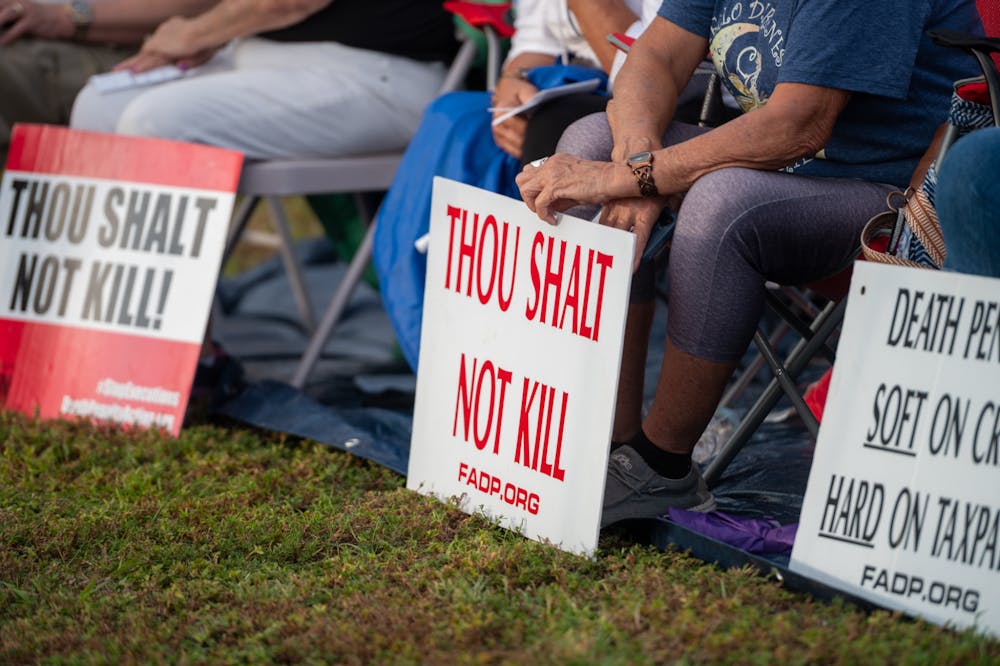Florida has put a record number of people to death this year, more than any other state in the country.
So far this year, the state has executed 13 people — a figure higher than any year since the U.S. Supreme Court reinstated the practice 50 years ago. The second-highest year for executions occurred in 2014, when the state executed eight people.
Florida residents make up just under 6% of the total U.S. population, but the state holds around 14% of the nation’s death row inmates, according to data from the U.S. Census Bureau and the Death Penalty Information Center.
Execution No. 14 is scheduled for Oct. 14.
While supporters of the death penalty argue it’s the only effective way to punish some crimes, opponents say the practice is cruel and expensive.
Since the state of Florida carried out its first execution in 1924, 315 people have been executed, only two of whom were women. The Supreme Court struck down the death penalty in 1972 for four years before bringing it back. After it was reinstated, Florida was the first state to resume executions.
The U.S. Supreme Court ruled in 2008 that, when it comes to crimes against individuals, the death penalty can only be used in cases of murder. But Gov. Ron DeSantis passed changes to Florida statutes in 2023 allowing its use in child sex abuse cases.
How the death penalty works
Electrocution was the main method of execution in Florida until the 1990s. In that decade, three electrocutions went awry, including two inmates catching on fire and a third bleeding from the nose while being electrocuted, according to the DPIC.
In 2000, the state began offering lethal injection as its new primary mode of execution. Lethal injection has a 7.2% chance of going awry, while electrocution has a little less than a 2% chance, according to DPIC.
DPIC Executive Director Robin Maher attributes the mistake rate to a lack of government transparency. It’s unclear where the state purchases the drugs it uses to carry out lethal injections, as names of companies supplying the drugs can be exempt from public record.
“Transparency reduces the risk of a botched execution,” Maher said.
Just six months after Florida began using lethal injection, an execution was botched, with staff taking over 30 minutes to find a second vein for the injection. Another one went awry in 2006, but Florida still uses lethal injection as its main method of execution.
Currently, at least eight of 12 jurors must recommend a death sentence to the judge — a change from just two years ago, when the sentence required unanimous recommendation from the jury. This eight-person approval is the lowest threshold in the country, according to Maher.
Legislators and parents pushed for the change after Nikolas Cruz, who killed 17 people at Marjory Stoneman Douglas High School in 2018, avoided the death penalty after three jurors voted to spare him in 2022.
Florida and Alabama are the only two states in the country that don’t require unanimous jury agreement for capital cases. However, the jury must still unanimously agree on at least one aggravating factor, or a circumstance in the case that warrants a higher punishment, including death or life imprisonment.
Following the sentencing phase, the case automatically goes to the Florida Supreme Court, which can reaffirm the death sentence or reverse it.
To overturn a death sentence, the convicted persons and their lawyers can submit appeals claiming trial errors or ineffective legal counsel. If those are denied, the person is executed.
In most other states, the courts are heavily involved in the signing of a death warrant, but in Florida, the governor has sole discretion of whether to sign.
However, the courts remain involved in Florida’s appeals process and must affirm the death sentence before the governor can consider it.
For the death penalty
A little over half of Americans support the death penalty for people convicted of murder, according to a 2024 Gallup poll.
Florida House Rep. Dean Black, a Republican, is part of that group, believing some crimes can only be effectively punished by death.
“It’s also a statement to society,” Black said. “It says there are crimes that are so horrible that you can only atone for that with your life.”
Black said the 14th execution is positive and signals justice being pursued. Floridians should want every year to have this many executions, and people should want the quick execution of those convicted of capital crimes, he said.
The appeals process needs to be reformed to allow for a quicker execution process, Black added. The average amount of time someone spends on death row is about 22 years, according to DPIC.
“It is taking too long for people who are condemned to work through the process and for the executions to be handed out,” he said. “Justice delayed is justice denied.”
Against the death penalty
Meanwhile, Floridians for Alternatives to the Death Penalty is fighting for an end to the practice.
The alternative: life in prison without the possibility of parole.
“The death penalty costs more than life without the possibility of parole,” executive director and former death row lawyer Maria DeLiberato said.
The cost of legal fees, jury selection, appeals and experts makes the death penalty more expensive than alternatives like life in prison, according to DPIC.
Florida has dropped charges against 30 death row prisoners since 1973, more than any other state. Most recently, a man was exonerated 42 years after being wrongfully convicted of murder. He was released in 2019 after a report found no evidence of his guilt.
These exonerations happen too frequently to consider the practice ethical, DeLiberato said. The risk of executing innocent people adds to the moral argument against the practice, she said.
Many, including FADP, also allege the system is racially biased in favor of white victims. Three-quarters of cases resulting in an execution have involved white victims since 1976, although about half of all homicide victims in the U.S. are Black, according to DPIC data.
The process will never be perfect, said Mark Schlakman, who previously worked to advise former Florida Gov. Lawton Chiles on issues of clemency. Schlakman combed through death warrants for about two years and advised Chiles on whether or not to sign the death warrants, the final stage before an execution is carried out.
During Chiles’ term from 1991 to 1998, 18 people were executed, according to DPIC.
“Until there is no death penalty, people are going to be subjected to the process, so why not improve it to the greatest reasonable extent,” he said.
Schlakman worked to improve the death penalty and execution process while serving as Chiles’ clemency advisor, he said. While the death penalty still exists in Florida, those responsible for carrying it out must fight to improve the fairness, accuracy and impartiality of the practice, he said.
Contact Alexa Ryan at aryan@alligator.org. Follow her on X @AlexaRyan_.

Alexa is a second-year journalism and international studies student and The Alligator's Spring 2026 Enterprise Politics Reporter. She previously served as the Fall 2025 Criminal Justice Reporter. In her free time, she enjoys running, traveling and going on random side quests.






